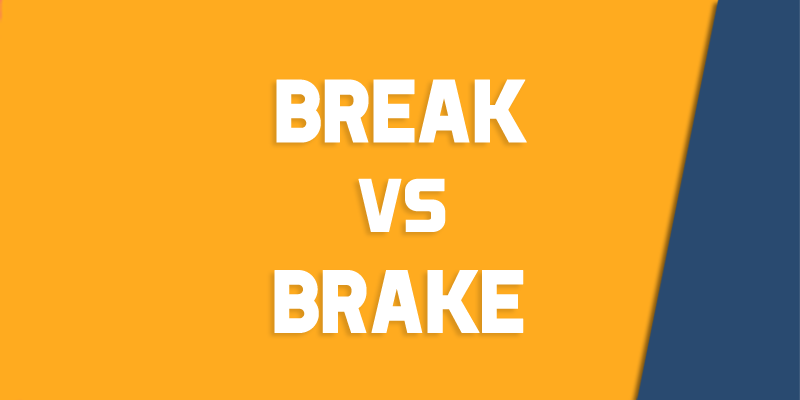Break vs. Brake – What’s the Gist?
Using these homophones incorrectly is a common error. Since break and brake are not interchangeable and this mistake will reflect poorly on your writing, you should know the difference.
- Break functions primarily as a verb.
- Brake is primarily a noun.
Although these words function as a primary part of speech, they have other denotations as well.

How to Use Break in a Sentence
Break definition: As a transitive and an intransitive verb, the word break has many nuances in denotations.
Its transitive function means to separate into parts with suddenness or violence; to cause a bone to separate or skin to open; to turn-over the surface of; to render inoperable; to violate; to force a way through; to make ineffectual; to interrupt; to cause a discontinuation of a habit; to ruin financially, to split into smaller units; to check the speed or force of something.
For example:
- While roughhousing in the dining room, the children knocked the delicate glass bowl off the table and it broke into hundreds of pieces. (Past Tense Verb)
- The smoker wanted to break the habit of vaping to improve his health. (Infinitive)
- After tripping down the porch steps, the bushes broke her fall. (Past Tense Verb)
Even as an intransitive verb, break reflects layers of essence. It means to come into being or as by bursting forth; a sudden dash; to achieve initial success; to shatter fragments; to interrupt an activity; to alter the voice in tone, pitch, or intensity.
For example:
- Day broke beautifully with rosy sunshine and fluffy clouds. (Past Tense Verb)
- When the child saw the open gate, she broke free. (Past Tense Verb)
- At the wedding, the father’s voice broke as he read his father of the bride speech. (Past Tense Verb)
This action carries over to acts found in the noun function of break. The substantive means an act of entering, escaping, or energizing; an opening caused by damage; or a place or situation at which a break occurs.
For example:
- Breaking free from the sound barrier must have been an exhilarating experience. (Gerund)
- The break in the pipes ruined the flooring with the extensive water damage. (Noun)
- The poet used a break in one of the lines of poetry. (Noun)
By the way, a gerund is a verbal with an –ing ending that functions as a noun.
As you can see, break has many nuances in meaning. Its versatility is impressive.
How to Use Brake in a Sentence
Brake definition: Brake, as a noun, means a device for stopping or preventing the motion of a mechanism usually by means of friction; or something used to slow down or stop movement or activity
For example:
- After hearing the sound of metal-on-metal, the driver took the car to the shop to get the brakes checked. (Noun)
- She put the brakes on the fast-moving relationship by telling her date that they should see other people. (Noun)
Additionally, brake operates as an intransitive, meaning to operate or manage a brake; or to become checked by a brake. As a transitive verb, brake means to slow or stop by or as if by a brake.
For example:
- The new driving student braked suddenly and violently. (Past Tense Verb)
- At the bottom of the hill, the bus braked to a stop. (Past Tense Verb)
- The truck driver braked the semi-trailer. (Past Tense Verb)
Outside Examples of Break vs. Brake
- It may be cold outside, but spring is just around the corner. A recent NerdWallet survey found that 33% of Americans plan to travel for spring break vacation this year. If you’re in this camp, now’s the time to make travel plans (if you haven’t already). –Star Tribune
- Brooklyn streets were flooded with murky water Tuesday morning after a water main break, according to officials and video. –New York Post
- The 110,000-square-foot facility on North Beach Street will perform wheel and brake maintenance, repair and overhaul operations and landing gear assembly, according to the company. Collins Aerospace will close its existing landing gear facility in Fort Worth in March. –The Dallas Morning News
- Schools in Milan were closed for seven days. So were cathedrals, bars, nightclubs and theaters. The Venice Carnival was shut down early and professional soccer games were canceled or played at empty stadiums across the country. Measures like these can put the brakes on a virus, said Dr. Abigail Carlson, an epidemiologist at Washington University School of Medicine in St. Louis. –Los Angeles Times
Phrases That Use Break and Brake
There are several phrases that use the word break or brake, including:
Break a leg: A message of good luck extended to a someone before a performance.
- Before the actor entered the theatre for her first on-stage performance, the family members told her to break a leg.
Break bread: Where people share a meal together.
- The teachers broke bread together in the teachers’ lounge.
Hit the brakes: To slow or stop the momentum of something.
- The couple hit the brakes on their relationship.
How to Remember These Words
This pairing of homophones is easily confused. While they do sound alike, they do not share the same spelling or the same definitions—making them noninterchangeable. To help to keep the correct spelling in mind, remember the position of the letter k.
In break, the letter k is found at the end of word. If you break something like a precious furbelow or a bone or a pipe, it might feel like it’s the end of the world.
In the term brake, the letter k is in the between the vowels. When driving a car, the only thing between you and death are your brakes.
For example:
- After seeing the break in the lamp, the grandmother treated the children like their carelessness was the end of the world.
- Her life flashed before her eyes as she applied the brakes to stop the car from hitting the deer.
Article Summary
Is break or brake correct? These homophones are easily confused. If you need a word that indicates pieces or parts of something, choose the word break. If you need to slow down or stop, use brake.
If you apply the brakes when driving your car, then you might not break anything.
- Break is a verb or a noun.
- Brake functions as a noun and a verb.
